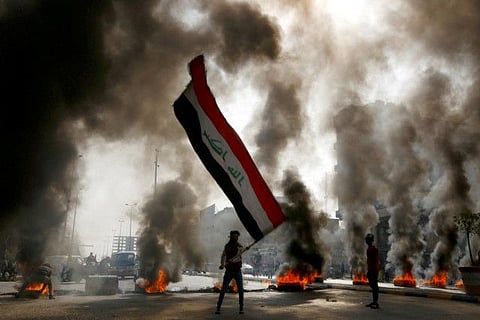Al Sistani calls for new Iraq PM without foreign influence
He said PM should be selected within 15-day window but is not involved in talks

Baghdad: Iraq’s top Shiite cleric said Friday he had no role in talks on a new premier for the protest-hit country, where apprehensive protesters remained on the streets despite widening intimidation campaigns.
Young protesters have thronged Baghdad and the Shiite-majority south since October, accusing the entrenched political elite of corruption and incompetence.
Last week, they brought down Iraq’s embattled premier, Adel Abdel Mahdi, who resigned after top Shiite cleric Grand Ayatollah Ali Sistani intervened following a crackdown on protesters.
This Friday, Sistani said the Shiite religious leadership, or “marjaiyah,” was not involved in talks on a new PM.
“The marjaiyah is not party to any discussions on this and has no role in any way whatsoever,” he said, in a sermon read by his representative in the shrine city of Karbala.
He did, however, urge that a new premier be selected within the 15-day window outlined in the constitution and with no “foreign interference.”
Iraq’s main political blocs have been debating candidates for the premiership but have yet to name anyone.
Iran, Hezbollah official part of discussions
Two key foreign officials have attended the talks, according to a senior political source - Iran’s pointman for Iraq Major General Qasem Soleimani and Mohammad Kawtharany, a leading power-broker from Lebanon’s Hezbollah movement.
Iran in particular wields tremendous sway among Iraqi political and military figures, especially the Hashed al-Shaabi paramilitary force.
But the protesters on the streets have publicly rejected what they say is Iran’s overreach and have vented their anger against its diplomatic missions.
Hashed switches sides to join protesters
On Thursday, demonstrators were rattled by the sudden arrival of several thousand Hashed supporters in Baghdad’s Tahrir (Liberation) Square, the epicentre of the protests.
In an apparent show of force, the newcomers waved sticks, national flags and the Hashed’s emblem - a symbol shunned by the vast majority of protesters.
The Hashed’s political arm, the Fatah bloc, had been one of the prime minister’s main backers throughout the crisis but changed its tune after Sistani’s call.
The Hashed began publicly supporting the protests and Sistani on their social media pages - while repeatedly claiming there were “infiltrators” within the crowds.
Demonstrators have expressed doubts about the genuineness of the Hashed’s support, saying Thursday’s display was an attempt to “ruin” their non-partisan rallies.
Apprehensive about a repetition on Friday, protesters said they would erect new checkpoints around the square overnight.
Tahrir has become a melting pot of Iraqi society, occupied day and night by thousands of demonstrators angry with the political system in place since the aftermath of the US-led invasion of 2003 and Iran’s role in propping it up.
Photographer abducted
Their public criticism of leading Iranian figures, including Soleimani, has broken a taboo and some among the protesters fear there will payback.
Many in Tahrir keep their faces covered, saying they have been filmed or photographed by individuals that they suspect are “not real protesters.”
They worry they could be kidnapped or worse if they are identified as having opposed Iran or its allies, or simply for taking part in anti-government rallies.
Earlier this week, the bruised body of 19-year-old Zahra Ali was left outside her family home, after she went missing from the morning, her father said.
And on Friday, the relatives of Zeid al-Khafaji, a young photographer who had become well-known in the square, said he too had been kidnapped.
They said he had been snatched from outside his home by unidentified men in SUVs as he was returning from Tahrir.
Human rights groups have documented dozens of cases of abductions since October and Human Rights Watch this week accused the government of not doing enough to protect activists.





